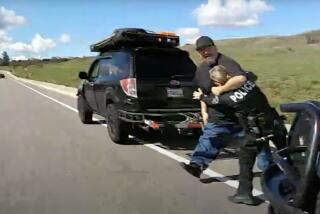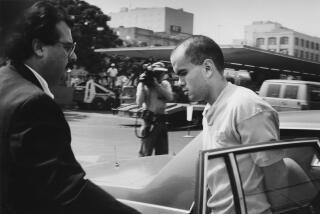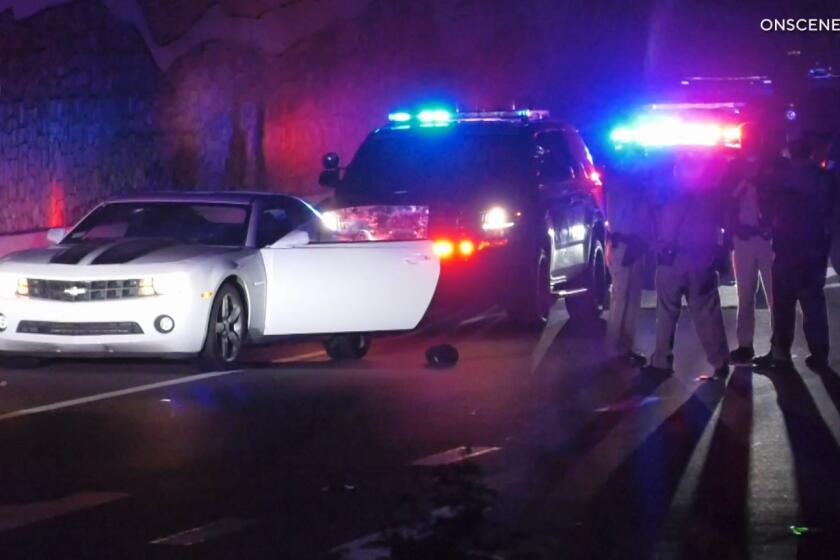‘98 Murder Conviction Is Reversed
An appellate court has thrown out a 1998 murder conviction for Gabriela Hernandez, an Oxnard mother serving a 15-year-to-life sentence for the beating death of her 2-year-old daughter.
The decision leaves prosecutors with the choice of retrying the 22-year-old woman or allowing a trial court to dismiss the lengthy sentence.
But even if prosecutors don’t seek a retrial, Hernandez still has time to serve before she is released from prison. In their ruling, appellate judges allowed several misdemeanor and felony child-abuse convictions to stand, counts that carried a six-year, four-month prison term.
Still, the attorney for Hernandez called the ruling a clear victory.
” I’m very pleased for my client,” said Susan Pochter, who handled the appeal for Hernandez. “I’m pleased she now has an opportunity to have the trial that she deserves with the evidence she deserves before the court.”
In their decision, justices from the 2nd Appellate District Court said Superior Court Judge James Cloninger erred when he barred testimony from two experts who called Hernandez a victim of battered women’s syndrome. That condition, the judges said, could have explained why Hernandez failed to stop her husband, Rogelio Hernandez, from pummeling Joselin Hernandez to death.
“The evidence would have supported Gabriela’s argument that she did not intend to facilitate Rogelio’s abuse of Joselin or place her daughter in danger, but perceived no option other than remaining silent,” the ruling reads.
William Maxwell, defense attorney for Gabriela Hernandez in the criminal trial, called his client a “classic battered woman” and praised the new decision.
“Once the judge took that away, she really had nothing to defend herself with,” said Maxwell, now working as a public defender in Riverside County. “She really deserves this. Let’s hope the [district attorney] agrees.”
Deputy Dist. Atty. Dee Corona, who handled the 1998 prosecution, declined to comment on the ruling or whether her office will seek a retrial.
Gabriela Hernandez and her husband are both serving prison sentences for the death of Joselin.
Prosecutors contended Rogelio Hernandez, 22, regularly beat the girl, finally delivering blows that ended her life on June 22, 1996.
An autopsy later showed the toddler died from blunt-force blows to her abdomen. Examiners also found a series of burns, bites and broken bones in various stages of healing all over the child’s body.
The girl’s death sparked a wave of controversy because county social workers were supposed to be monitoring the child’s welfare following a 1994 incident.
In that incident, Joselin, then about 6 weeks old, was hospitalized for fractured ribs, broken legs and burns to her hands and feet. Social workers removed Joselin from her parents’ care, but she was returned to them in 1996. A case worker was assigned to the family for regular visits.
After the girl’s death, both parents were arrested and the couple were tried together for Joselin’s death.
Rogelio Hernandez was convicted of first-degree murder and sentenced to 25 years to life.
Prosecutors also successfully convinced jurors that Gabriela Hernandez was in part responsible for the child’s death because she had failed to stop beatings inflicted by Rogelio Hernandez. She was found guilty of second-degree murder and one count of fatal assault on a child. The appellate court overturned both of those convictions.
During the criminal trial, Maxwell sought to introduce experts to testify that Gabriela Hernandez also suffered from her husband’s abuse. Gabriela Hernandez, who married at 16, was so firmly under her husband’s control that she thought she had no way of preventing the attacks, according to Inez Monguio, the clinical neuro-psychologist Maxwell had sought to call as a witness.
“She perceives herself as powerless and helpless,” Monguio’s report said. “While living with Rogelio, she knew that resistance would be useless or would bring even more damage to herself and Joselin. In her distorted reality, she had to keep Rogelio happy to protect Joselin.”
Cloninger, however, ruled evidence could not be introduced to jurors because it would be too prejudicial for co-defendant Rogelio Hernandez.
If Gabriela Hernandez did not take the stand and allow her husband’s attorney to cross-examine her, Cloninger ruled, Monguio and others could not testify. Gabriela Hernandez did not testify, so the experts were never heard.
But the appellate judges said Cloninger should have tried Gabriela and Rogelio Hernandez separately in front of different juries.
“The trial court abused its discretion by requiring appellants to proceed with a joint trial,” the judges said.
They added that Gabriela Hernandez did not have to take the stand to allow her experts to testify. Experts routinely assess defendants who never take the stand, the jurists said.
Cloninger declined to comment on the ruling.
Rogelio Hernandez also filed an appeal, arguing he should have been given his own trial. Although expert testimony on the abuse allegations were not presented to the jury, friends and family of the couple did testify that Rogelio Hernandez had beaten his wife. That information, Hernandez argued, was prejudicial.
The court, however, rejected that argument, noting “the evidence was overwhelming that Rogelio repeatedly abused Joselin before finally killing her.”
More to Read
Start your day right
Sign up for Essential California for news, features and recommendations from the L.A. Times and beyond in your inbox six days a week.
You may occasionally receive promotional content from the Los Angeles Times.




